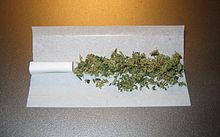Joint (cannabis)
You can help expand this article with text translated from the corresponding article in Spanish. (January 2021) Click [show] for important translation instructions.
|

| Part of a series on |
| Cannabis |
|---|
 |


A joint ( /dʒɔɪnt/) is a rolled cannabis cigarette. Unlike commercial tobacco cigarettes, the user ordinarily hand-rolls joints with rolling papers, though in some cases they are machine-rolled.[1] Rolling papers are the most common rolling medium in industrialized countries; however, brown paper, cigarettes or beedies with the tobacco removed, receipts and paper napkin can also be used, particularly in developing countries.[2] Modern papers are manufactured in a range of sizes from a wide variety of materials including rice, hemp, and flax, and are also available in liquorice and other flavored varieties.[3]
Joint size can vary,[4] typically containing between 0.25 and 1 g (1⁄112 and 1⁄28 oz) net weight of cannabis. Tobacco is sometimes used in the rolling process.[5][6]
Variations and terminology
[edit]Although joints by definition contain cannabis,[7] regional differences exist. In Europe, in certain Commonwealth nations, and more recently in North America, joints, or spliffs,[8] typically include a cigarette filter or a bit of rolled thin cardboard in one end to serve as a mouthpiece, commonly referred to as the crutch, filter, or roach. The term "spliff" is sometimes used to distinguish a joint prepared with both cannabis and tobacco,[9] as is commonly done in European countries, where joints containing only cannabis are uncommon.[10] In the West Indies where this term originated (especially Jamaica), a spliff is simply a marijuana cigarette, normally containing no tobacco.[11]
Special vaporizers, made to look like joints, have also been designed for use with cannabis extract.[12]

Etymology and synonyms
[edit]This section may require cleanup to meet Wikipedia's quality standards. The specific problem is: formatting. (March 2016) |
The word joint ultimately originated from French, where it is an adjective meaning 'joined' (past participle of the verb joindre), derived in turn from Latin iunctus, past participle of iungere ('join'/'bind'/'yoke'). By 1821, 'joint' had become an Anglo-Irish term for an annexe, or a side-room 'joined' to a main room. By 1877, this had developed into U.S. slang for a 'place, building, establishment,' and especially to an opium den. Its first usage in the sense of 'marijuana cigarette' is dated to 1938.[13]
Many slang terms are synonymous with the word joint. 'Spliff' is a West Indian word of Jamaican English origin which has spread to several western countries, particularly the UK and Europe. Its precise etymology is unknown, but it is attested as early as 1936. There is also a myth that, because it is smoked within joint circle of friends, it is known as a 'joint'. 'J' or 'jay' can be used as an abbreviation for a generic joint. Another frequently used term is 'doobie.'[14] The end or butt of a mostly smoked joint is referred to as a "roach" in U.S. and Australian slang.[15] Small metal clips to facilitate the smoking of a "roach" are called "roach clips".[16] In the UK the term roach is commonly used to describe the cardboard mouthpiece. Roach clips cover a wide variety of paraphernalia including alligator clips, forceps, needle nose pliers, ceramic pieces with holes through them, and tweezers.[17]
See also
[edit]- Blunt (cannabis)
- Cannabis smoking
- Medical cannabis
- Recreational drug use
- Vaporizer (inhalation device)
References
[edit]- ^ Rubin, Vera. Cannabis and Culture. Walter de Gruyter, 1975. p. 509.
- ^ e.g., in Jamaica: The Rastafarians by Leonard E. Barrett p. 130.
- ^ "Roll Your Own Magazine – Winter-Spring 2008". Ryomagazine.com. Archived from the original on 21 July 2011. Retrieved 20 April 2011.
- ^ "Dope activist to smoke 1m long joint". news.com.au. 26 November 2006. Archived from the original on 28 October 2009. Retrieved 28 January 2012.
- ^ World Health Organization: Division of Mental Health and Prevention of Substance Abuse (1997). Cannabis: a health perspective and research agenda (PDF). p. 11. WHO/MSA/PSA/97.4. Archived from the original (PDF) on 23 December 2014. Retrieved 1 December 2008.
- ^ Hindocha, Chandni; Freeman, Tom P.; Curran, H. Valerie (August 2017). "Anatomy of a Joint: Comparing Self-Reported and Actual Dose of Cannabis and Tobacco in a Joint, and How These Are Influenced by Controlled Acute Administration". Cannabis and Cannabinoid Research. 2 (1): 217–223. doi:10.1089/can.2017.0024. PMC 5628568. PMID 29082319.
- ^ "Joint". Dictionary.reference.com. Archived from the original on 23 April 2011. Retrieved 20 April 2011.
- ^ "Online Etymology Dictionary". Etymonline.com. Archived from the original on 11 January 2012. Retrieved 20 April 2011.
- ^ Australian Government Department of Health: National Cannabis Strategy Consultation Paper Archived 27 February 2011 at the Wayback Machine, page 4. "Cannabis has been described as a 'Trojan Horse' for nicotine addiction, given the usual method of mixing cannabis with tobacco when preparing marijuana for administration."
- ^ Damien Gayle (9 July 2016). "Cannabis users who put tobacco in joints 'more likely to be addicted'". The Guardian. Archived from the original on 20 January 2018. Retrieved 20 January 2018.
- ^ Dictionary of Jamaican English (2., digitally printed version ed.). Cambridge: Cambridge Univ. Press. 2009. p. 420. ISBN 9780521118408.
- ^ "World's first e-joint given its debut by Dutch firm, says it's selling 10,000 a day" Archived 25 September 2015 at the Wayback Machine. The Independent. Retrieved 8 December 2014.
- ^ "Online Etymological Dictionary". Etymonline.com. Archived from the original on 14 May 2011. Retrieved 20 April 2011.
- ^ "Spliff". Dictionary.reference.com. Archived from the original on 29 April 2011. Retrieved 20 April 2011.
- ^ "Roach". Thefreedictionary.com. Archived from the original on 10 April 2018. Retrieved 9 April 2018 – via The Free Dictionary.
- ^ "The Free Dictionary". Thefreedictionary.com. Archived from the original on 13 March 2016. Retrieved 29 March 2016.
- ^ "Roach Clip". lookah.com. Archived from the original on 26 January 2021. Retrieved 10 October 2020.
